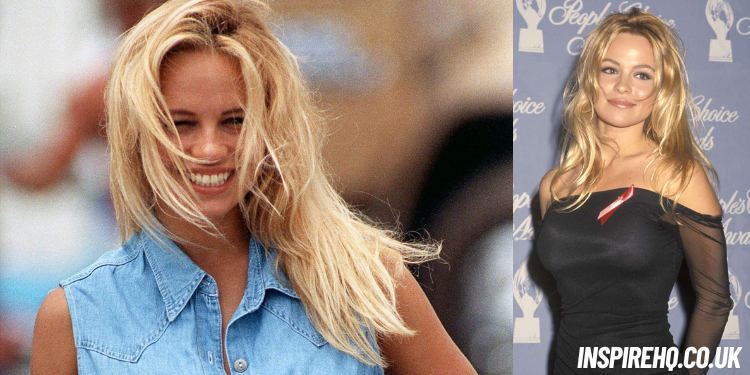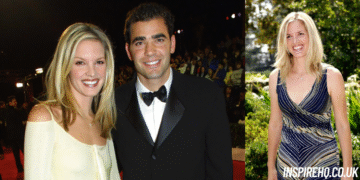In this article, we’ll explore Pamela Anderson Young life, long before she became an international icon. From her modest upbringing in a small Canadian town to the serendipitous moment that launched her career, Pamela’s journey is one of resilience, unexpected fame, and personal evolution. Her early years, though often overshadowed by her celebrity image, reveal a thoughtful and determined young woman who would grow into more than just a pop culture figure.
Quick Bio:
| Full Name | Pamela Denise Anderson |
|---|---|
| Date of Birth | July 1, 1967 |
| Age (as of 2025) | 58 years old |
| Birthplace | Ladysmith, British Columbia, CA |
| Nationality | Canadian-American |
| Height | Approx. 5 ft 7 in (170 cm) |
| Hair Color | Blonde |
| Eye Color | Blue |
| Family | Parents: Barry & Carol, Brother: Glen |
| Career Start | 1989 (Labatt’s ad, Playboy) |
| Breakout Role | C.J. Parker in Baywatch |
| Lifestyle | Vegan, activist, animal rights |
| Memoir | Love, Pamela (2023) |
| Social Media | Active on Instagram, Twitter/X |
Humble Beginnings in British Columbia
Pamela Anderson was born on July 1, 1967, in the quiet coastal town of Ladysmith, nestled in British Columbia, Canada. Life in Ladysmith was simple, shaped by nature and close-knit community values. Pamela grew up in a modest household, with her father working as a furnace repairman and her mother as a waitress. She had a younger brother, Glen, and together they shared the kind of childhood filled with bike rides, lake swims, and plenty of imagination.
Despite the warmth of family life, Pamela has often shared that her childhood wasn’t free from hardship. She experienced moments of trauma that deeply affected her, and those early emotional experiences would later influence her outlook on relationships, identity, and activism. But even through difficulty, Pamela’s spirit remained curious and sensitive. She was a gentle, observant girl who cared deeply for animals and had an early awareness of injustice. These emotional layers, though rarely seen in early media portrayals, were foundational to the woman she would become.
School Life and Early Compassion
Pamela was never the loudest in the room, nor the kind of girl who sought the spotlight. In school, she was friendly but shy, more comfortable observing than leading. She enjoyed creative subjects and had a love for literature and nature. What stood out about her, even then, was her strong moral compass. From a young age, she showed compassion toward animals, a trait that only grew stronger over time.
One of the pivotal moments in her youth was witnessing animal cruelty firsthand—something as simple as a hunting incident sparked a major shift in her thinking. This led her to adopt vegetarianism early on and begin questioning the broader treatment of animals in society. While many teens were focused on fashion or popularity, Pamela was quietly becoming a person guided by empathy and principle. That early sense of responsibility and care for the voiceless would later blossom into full-blown activism in adulthood.
The Accidental Breakthrough
Pamela’s transition from small-town girl to international sensation began with a moment no one could have predicted. In 1989, while attending a British Columbia Lions football game, she was shown on the stadium’s jumbotron wearing a Labatt’s Blue beer T-shirt. The crowd responded enthusiastically, and it wasn’t long before the beer company contacted her for a commercial. That simple moment—unplanned and unpolished—was the first domino to fall.
Suddenly, people were paying attention. She had a magnetic presence, the kind that couldn’t be manufactured. Pamela moved to Vancouver, and soon after, her images reached Playboy, which invited her to model for the magazine. She accepted, and it led to her being featured on the cover and eventually named Playmate of the Month. It was a bold move that required confidence and courage, especially at a time when young women were often boxed into labels. For Pamela, it marked the beginning of a very different life, one that would bring both fame and scrutiny.

Modeling to Television Stardom
With her growing popularity from Playboy, Pamela decided to relocate to Los Angeles to pursue modeling and acting. She started landing small television roles, and one of her first recurring appearances was on the sitcom Home Improvement, where her charisma and beauty immediately captured attention. But it was her casting in Baywatch that turned her into a global icon. Playing the role of C.J. Parker, she became the face of the show and helped catapult it into one of the most-watched series of its time.
The red swimsuit, the slow-motion runs, the sunlit beaches—these became symbols of Pamela’s early fame. Yet behind the on-screen glamour was a young woman still navigating her way through the entertainment industry. She was adjusting to intense media attention, typecasting, and public commentary that often overlooked her intelligence and heart. At a time when the world only wanted to talk about her looks, Pamela was trying to make sense of her identity and career path. These years were filled with both enormous opportunity and deep personal learning.
More Than Just a Media Image
While Pamela’s image became a cultural phenomenon, there was always more to her than met the eye. She wasn’t just a model or an actress—she was a person with opinions, causes, and emotional depth. Throughout her twenties and early thirties, Pamela began speaking out about issues that mattered to her. Whether it was animal rights, environmental protection, or women’s autonomy, she began to use her voice, even when it didn’t fit the brand others had created for her.
There’s a strong emotional honesty in how Pamela describes her youth. She has spoken openly about feeling misunderstood and objectified, even as she appreciated the opportunities she’d been given. Those early experiences taught her to be discerning, to know her own worth beyond fame, and to remain grounded in her values. It’s a journey that many young women in the spotlight face—but Pamela’s story stands out for how she turned fame into fuel for growth and advocacy.
Legacy of Her Early Journey
The story of young Pamela Anderson is not just about becoming famous. It’s about resilience, curiosity, and staying connected to one’s true self in a world that often pushes you to perform. Her early life gave her a unique lens—one that saw the spotlight as both gift and burden. But instead of letting it define her, she chose to evolve.
Her recent memoir, Love, Pamela, and accompanying Netflix documentary revealed a more vulnerable, thoughtful woman than the public ever saw in the 1990s. Reflecting on her youth, she offered insights not just into fame, but into healing, identity, and self-respect. These reflections add a powerful layer to her early story, turning what was once viewed as a glamorous rise to fame into a much richer portrait of growth, survival, and transformation.
FAQs:
1. How old was Pamela Anderson when she first became famous?
Pamela was around 22 years old when she was first featured in Playboy and began gaining international attention.
2. Where did Pamela Anderson grow up?
She grew up in Ladysmith, British Columbia, a small coastal town in Canada known for its nature and quiet charm.
3. What made Pamela Anderson famous as a young woman?
She became famous after being spotted on a stadium screen during a football game and then appearing on the cover of Playboy, which led to modeling and TV roles.
4. Was Pamela Anderson always interested in activism?
Yes, even as a teenager she showed a deep care for animals and the environment, which became central to her identity over time.
5. Did Pamela Anderson speak openly about her youth?
She shared her personal story in the memoir Love, Pamela and in her Netflix documentary, offering honest reflections on her early fame and private struggles.
Also Read: Leslie Abramson Net Worth and Career: A Legacy Beyond the Headlines










